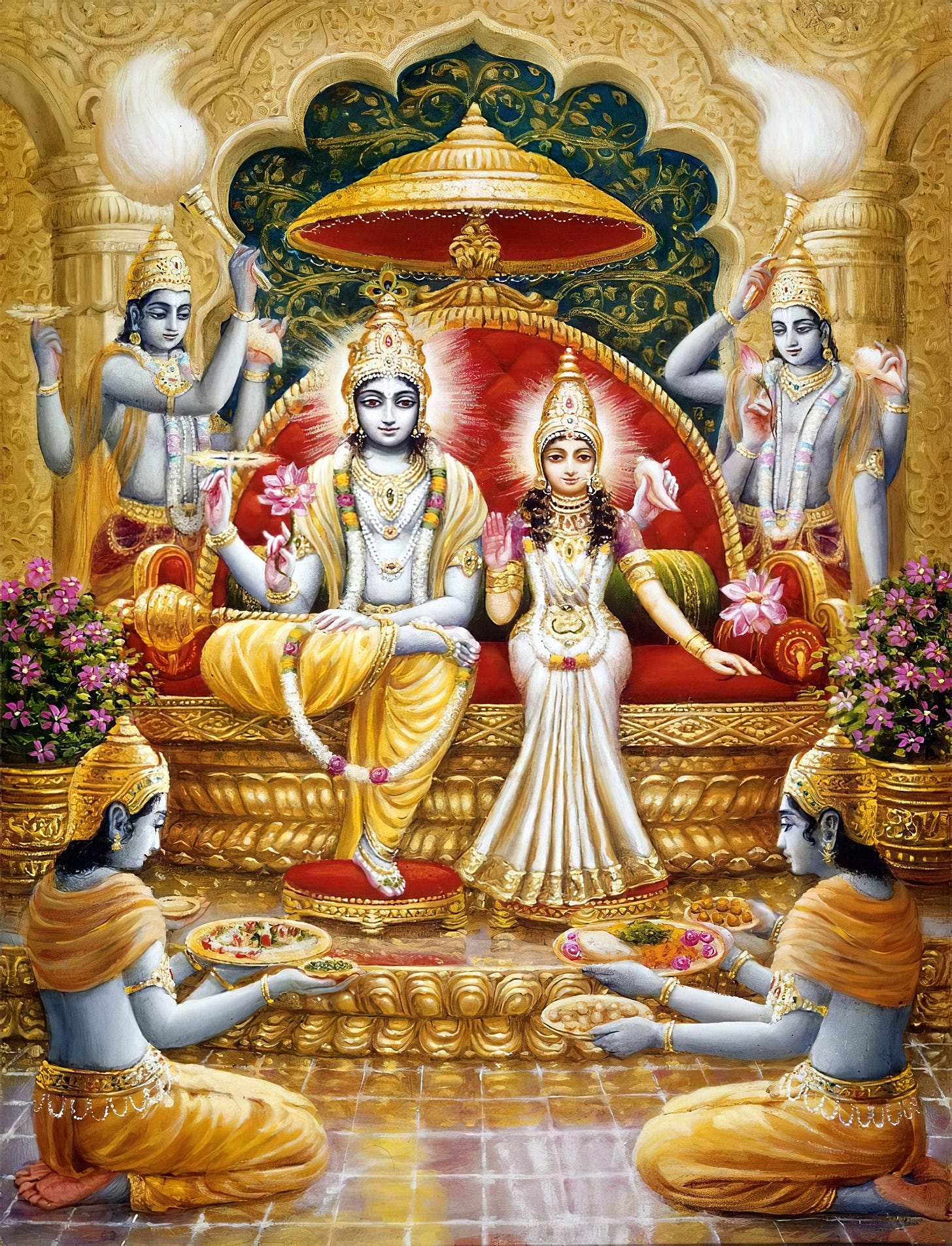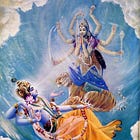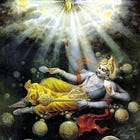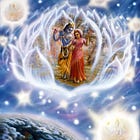Jaya and Vijaya are cursed by the four Kumāras
Although the Kumāras appeared to be offended and angry towards Jaya and Vijaya, the Lord understood that the essence of the problem was that the Kumāras were anxious to see Him.
Jaya and Vijaya are eternal servitors of the Lord, but at the same time, they committed a mistake in stopping the four Kumāras at the gates of Vaikuṇṭha when they wanted to see the Lord.
Although the Kumāras appeared to be offended and angry towards Jaya and Vijaya, the Lord understood that the essence of the problem was that the Kumāras were anxious to see Him, and therefore he went personally there, accompanied by Lakṣmī Devi to give them an audience. In his purport, Prabhupada mentions the case of Haridāsa Thākura, who was also not allowed to enter the temple to see Lord Jagannātha in Puri. Just like the Lord came to see the Kumāras, He was also coming personally to see Haridāsa Thākura as Sri Caitanya Mahāprabhu. As Prabhupada says, “The Lord is so merciful that even if there is some impediment for the devotee, He Himself manages matters in such a way that the devotee is not bereft of having audience at His lotus feet.” That’s surely inspiring.
However, there was still the question of the offense committed by Jaya and Vijaya. In his purport, Srila Prabhupada makes the point that an offense to a devotee of the Lord is always wrong, and even if one is promoted to Vaikuṇṭha there is still the chance that one may commit offenses. The difference however is that even if such advanced devotees accidentally commit some offense, they are protected by the Lord, different from conditioned souls who are averse to the Lord and thus have to face the results of their activities by themselves.
The Lord very politely accepted the offense of Jaya and Vijaya like an offense committed by Himself, saying that “A wrong act committed by a servant leads people in general to blame his master, just as a spot of white leprosy on any part of the body pollutes all of the skin.”
At this point, the Kumāras had already cursed Jaya and Vijaya for not allowing them to enter Vaikuṇṭha. That was unprecedented. How could someone from the material world come and forcefully drag down two eternal associates of the Lord out of Vaikuṇṭha?
The Lord, however, accepted the curse uttered by the Kumāras by saying:
“These servants of Mine have transgressed against you, not knowing the mind of their master. I shall therefore deem it a favor done to Me if you order that, although reaping the fruit of their transgression, they may return to My presence soon and the time of their exile from My abode may expire before long.”
In the following verses, the Lord reassures the Kumāras of His appreciation for their devotional service, and of His divine protection to all His devotees. As Prabhupada explains in his purport, this doesn’t apply just to pure devotees like the Kumāras, but in fact to any person who is seriously practicing Krsna Consciousness. Even if one is not a pure devotee now, the fact he is practicing means that is just a matter of time before he becomes purified, and as a result he is immediately accepted by the Lord, who is ready to give him protection.
One of the meanings of this whole passage is exactly that the Lord is so eager to protect His devotees that He is ready to even cut His own arm if it somehow becomes hostile to them, what to say about punishing others? A devotee can thus be confident in his practice of devotional service, and understand that although material reverses can be present, his ultimate success is assured. No one can prevent a devotee from achieving perfection, apart from the devotee himself.
On the other hand, the Lord also glorifies the attitude of Jaya and Vijaya, who although being cursed by the Brahmanas didn’t think of retaliating. The Kumāras could understand that although the Lord was speaking as if He was wrong, He was speaking in such a humble way just to show them His favor. The words of the Lord sounded mysterious to them, because although the Lord is the Supreme controller of everything and the cause of all causes, worshipable by all demigods, He values so much brāhminical culture that He shows example himself by worshiping Brahmanas like the four Kumāras. This is all due to His causeless mercy to all.
When the word “brāhmanas” is mentioned, it should be understood that it refers to both Brahmanas and Vaiṣnavas. Vaiṣnavas are automatically Brāhmanas, because they practice the essence of brāhminical culture, which is devotional service to the Lord.
What happened afterwards? After being praised by the Lord in such a way, the hearts of the Kumāras were softened and they regretted having cursed Jaya and Vijaya, understanding now that they are eternal servitors of the Lord and have all good qualities. Their mistake in stopping them can’t thus be considered a fault, but just an accident, and should not have been taken seriously.
The whole incident is a great example of Vaiṣnava etiquette. Jaya and Vijaya committed a mistake by not allowing the Kumāras to see the Lord, and as a result, the sages became angry and cursed them. The gatekeepers however didn’t retaliate, assuming a humble position. The Lord then appeared in the scene, pacifying the Kumāras with soft words and taking the blame for the actions of his servitors. As a result the Kumāras also became humble and regretted having cursed Jaya and Vijaya, understanding that they are faultless servants of the Lord.
The Lord told Jaya and Vijaya that although He could nullify the curse of the sages, He chose to not do so. Instead, He gave His approval to it, fixing a term of three lives, in which Jaya and Vijaya would come to the material world as demons, and then return to their positions in the spiritual world. With this, the scene for many of the pasties narrated in the Srimad Bhagavatam was set. Jaya and Vijaya would appear as Hiraṇyakaśipu and Hiranyaksa, setting the stage for the appearance of the Lord as Varāhadeva and Nṛsiṁhadeva, as well as the appearance of Prahlāda Maharaja and others. Later they would appear as Ravana and Kumbhakarna, leading to the appearance of Lord Rama and many wonderful pastimes, and in their last lives they would come as Sisupala and Dantavakra, participating in the Lord’s pastimes out of Vrindavana.
The “fall” of Jaya and Vijaya thus happened with the consent of the Lord, otherwise, it would be impossible for any external force, including even a brāhminical curse to push two eternal associates of the Lord out of their eternal positions in the spiritual world. As Prabhupada concludes, “All these incidents, therefore, were designed by the Lord Himself for the sake of His pastimes in the material world.”
Read also:






Hare Krishna Prabhu ji 🙏 very inspiring article in such a way that we are not pure devotees but we are following Krishna consciousness and try to become pure , still Krishna accepts us and ready to protect ourselves. Thank you prabhu ji for encouraging us by your article 😊